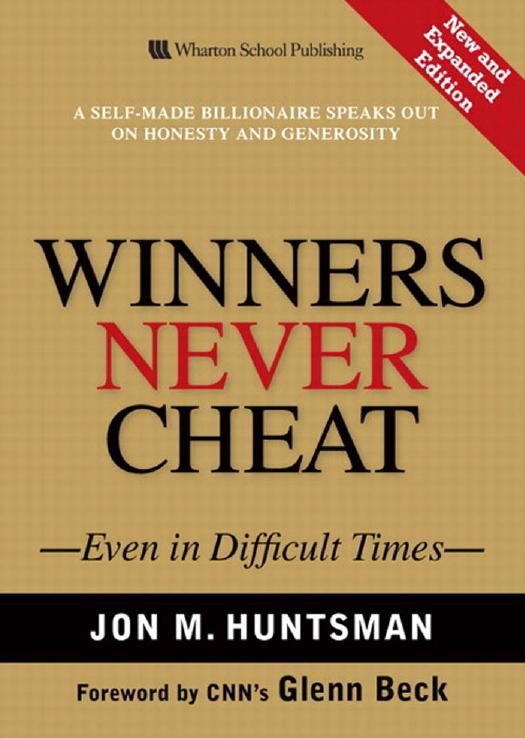Winners Never Cheat: Even in Difficult Times, New and Expanded Edition by Jon M. Huntsman

Author:Jon M. Huntsman [Huntsman, Jon M.]
Language: eng
Format: epub, azw3, pdf
Publisher: Pearson Education (US)
Published: 2008-10-29T04:30:00+00:00
Our values, if properly anchored, will see us through these storms. Take a deep breath in the middle of a crisis and consider these bright stars in our human solar system. If they are aligned, all is well. From there, one can set about restructuring what it is that put us in the mess. Never adjust your values downward. To do so requires that you must lie to yourself. Once you see yourself as a fraud, your positive self-image evaporates. The best way to keep that from happening when in crisis mode is to actively change the status quo. Talk to people, take a break, stuff any money left under a mattress until the hurricane blows over. Start over. (I have started over on three occasions, each time reaching or exceeding a billion dollars in value.) It can be done, and you can do it.
Now for the twist I mentioned earlier with the cheating experiment: The people in the test (and anywhere else, for that matter) knew inwardly that dishonesty is wrong. The concept of honesty was not new to them, but basic knowledge of right and wrong behavior is not always sufficient to keep people on the straight and narrow, the Mazar-Amir-Ariely study concluded. “The question is not whether a person knows it is wrong to behave dishonestly, but rather whether he or she thinks of those (moral) standards and compares his or her behavior to the standards at the moment the person is tempted to behave dishonestly.”
So, in the second go-round with the 229 student participants, they were asked to complete a short assignment before taking the exam that would reward them financially for each correct answer. Half of the students were instructed to write down 10 books they had read in high school; the other half was asked to recall as many of the 10 Commandments as they could remember. There was no direct reward for either of these preliminary tasks.
On average, the participants remembered only about four of the Commandments, but it was enough. In the group that had to recall its high school reading, the cheating level was the same as the day before, but cheating was significantly lower for the group that first had to recall the Commandments, the basic moral code for a Judeo-Christian culture. In a nutshell, this is what the three researchers made of it: When reminded of our core values, the tendency for deception decreases.
When reminded of our core values, the tendency for deception decreases.
Download
Winners Never Cheat: Even in Difficult Times, New and Expanded Edition by Jon M. Huntsman.azw3
Winners Never Cheat: Even in Difficult Times, New and Expanded Edition by Jon M. Huntsman.pdf
This site does not store any files on its server. We only index and link to content provided by other sites. Please contact the content providers to delete copyright contents if any and email us, we'll remove relevant links or contents immediately.
| Ethics | Etiquette |
| Fashion & Image | Health & Stress |
| Motivation & Self-Improvement | Work Life Balance |
| Workplace Culture |
Tools of Titans by Timothy Ferriss(8396)
Change Your Questions, Change Your Life by Marilee Adams(7781)
Deep Work by Cal Newport(7083)
Playing to Win_ How Strategy Really Works by A.G. Lafley & Roger L. Martin(6306)
Man-made Catastrophes and Risk Information Concealment by Dmitry Chernov & Didier Sornette(6019)
Big Magic: Creative Living Beyond Fear by Elizabeth Gilbert(5771)
Digital Minimalism by Cal Newport;(5764)
Ego Is the Enemy by Ryan Holiday(5448)
The Slight Edge by Jeff Olson(5417)
The Motivation Myth by Jeff Haden(5212)
The Laws of Human Nature by Robert Greene(5208)
Stone's Rules by Roger Stone(5088)
Tuesdays with Morrie by Mitch Albom(4784)
Eat That Frog! by Brian Tracy(4540)
Rising Strong by Brene Brown(4459)
Skin in the Game by Nassim Nicholas Taleb(4248)
The Money Culture by Michael Lewis(4207)
Bullshit Jobs by David Graeber(4190)
Skin in the Game: Hidden Asymmetries in Daily Life by Nassim Nicholas Taleb(4007)
